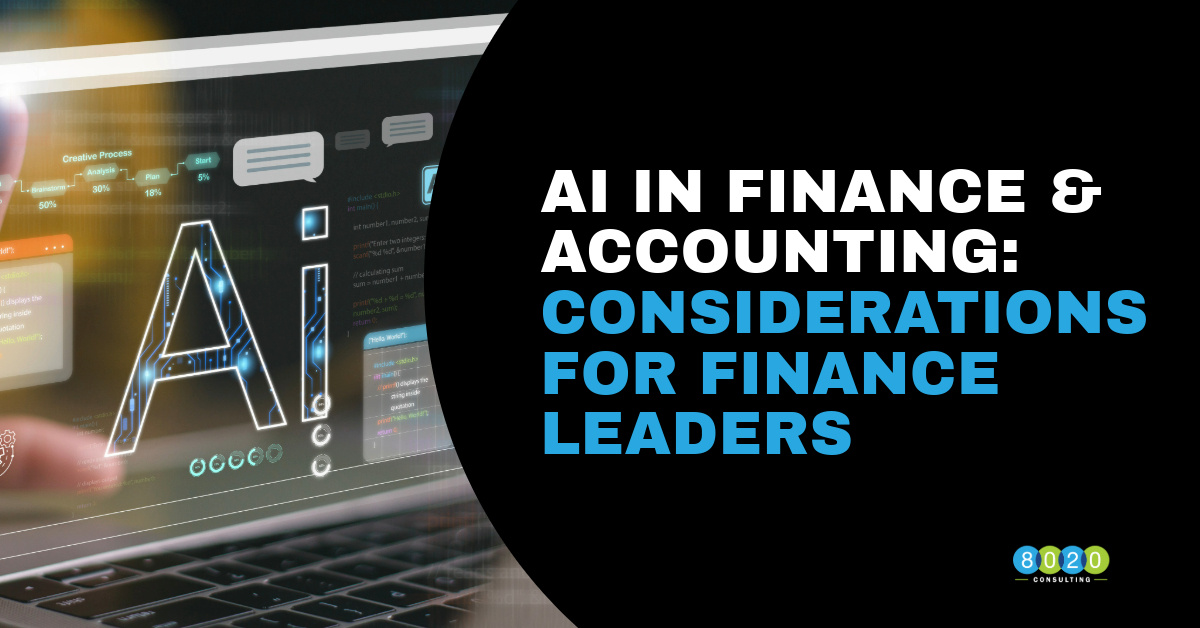AI in Finance and Accounting: Key Considerations for Finance Professionals
- Updated on October 1, 2024
- Marco Moreno
- Approx. Read Time: 4 minutes read
- Published on August 2, 2024


Discussions about AI’s future role across industries accelerated since the public release of ChatGPT in 2022. Besides ChatGPT Enterprise from OpenAI, several other vendors have introduced similar initial AI solutions, including versions tied to Finance ERPs such as:
With that said, the initial solutions do not appear to be features of the main ERP products just yet, and there is limited cost information for Finance and Accounting-specific solutions. Considering this backdrop, we believe Finance and Accounting teams should consider the following factors in approaching AI in the future.
Currently, over 90% of Fortune 500 companies are using ChatGPT in some form, according to OpenAI. Furthermore, the consulting arms of the Big 4 Accounting firms (PWC, Deloitte, KPMG, E&Y) along with Accenture are starting to propagate the use of AI across industries, including via partnerships with OpenAI, with their accounting practices deploying AI internally to identify irregularities and inconsistencies. Lastly, over 40% of CFOs recently surveyed by Deloitte stated their organizations are already experimenting with generative AI, and a recent study listed Accounting as one of the professions whose tasks will be reduced by at least 50%. These developments suggest that CFOs and Finance teams should begin exploring how AI can be adopted in their organizations ahead of a likely broader application in the intermediate term.
Since in our experience, Finance and Accounting teams oversee a lot of data often handled via manual processes, we can see how it may be among the initial areas companies look at for AI experimentation. While AI approaches are often driven by IT departments, CFOs and their teams should engage with CIOs and their teams to shape strategy and execution on initial pilot projects given how their input can identify appropriate data sets. Finance and Accounting functions, with their inherent data-centric nature, are particularly suited for such AI-driven innovations.
One significant benefit of AI in Finance and Accounting is its ability to handle large datasets and perform complex calculations quickly and accurately. For example, AI can automate repetitive tasks such as data entry and reconciliation, freeing up valuable time for finance professionals to focus on more strategic activities. Moreover, AI-powered analytics can provide deeper insights into financial data, helping organizations make more informed decisions.
At this time, most applications of AI in Finance and Accounting departments are fairly cautious. Producing summaries of emails or meeting/calls (which we have seen in practice) are in use, as are earnings-call-related tasks such as predicting questions from investment analysts or generating scripts. The ideal future uses being discussed include tasks like:
Beyond these current uses, the future potential of AI in Finance and Accounting is vast. For instance, AI could be employed to predict financial risks by analyzing historical data and identifying patterns that humans might miss. It could also enhance fraud detection by monitoring transactions in real-time and flagging any anomalies that suggest fraudulent activity. Additionally, AI can aid in strategic planning by modeling different financial scenarios and providing recommendations based on predictive analytics.
While the ideal Finance and Accounting uses mentioned above would be welcomed by any CFO, several precautions should be considered besides data privacy. First, output from AI models typically hinges on statistically highest probability results instead of accuracy, which has kept industries like insurance underwriting from fully embracing AI. Second, assumptions made by AI models may also be incorrect, especially considering how some input variables such as inflation and GDP growth have been volatile. Lastly, asking the right input questions and vetting output from AI models will still be needed from knowledgeable team members, preferably tech-savvy finance professionals. For example, while AI has had some early successes in auditing, problems dealing with tax, financial analysis, or managerial assessment presented challenges for the models, supporting a point from a UPenn study that occupations which require critical thinking are less likely to be impacted by AI. Additionally, a recent text case pitted ChatGPT vs. Accounting students and success rates were 47% vs. 77%, respectively.
Moreover, ethical considerations must also be taken into account when implementing AI in Finance and Accounting. Ensuring that AI systems are transparent and their decision-making processes are explainable is crucial for maintaining trust and accountability. Finance and Accounting professionals must be trained to understand and oversee AI tools to ensure they are used responsibly and effectively.
Based on the current state of AI in the Finance and Accounting realm, we suggest the following approach:
Additionally, ongoing education and adaptation will be key as AI continues to evolve. Staying informed about the latest advancements and best practices in AI will help Finance and Accounting teams leverage these technologies effectively. By taking a proactive and strategic approach to AI adoption, organizations can unlock new efficiencies, improve decision-making, and maintain a competitive edge in the ever-changing financial landscape.
Organizations increasingly use audit management systems (AMS) to ...
Read MoreAuditing plays a vital role in ensuring compliance, managing risk, ...
Read MoreManaging compliance and security is increasingly complex, especially ...
Read More